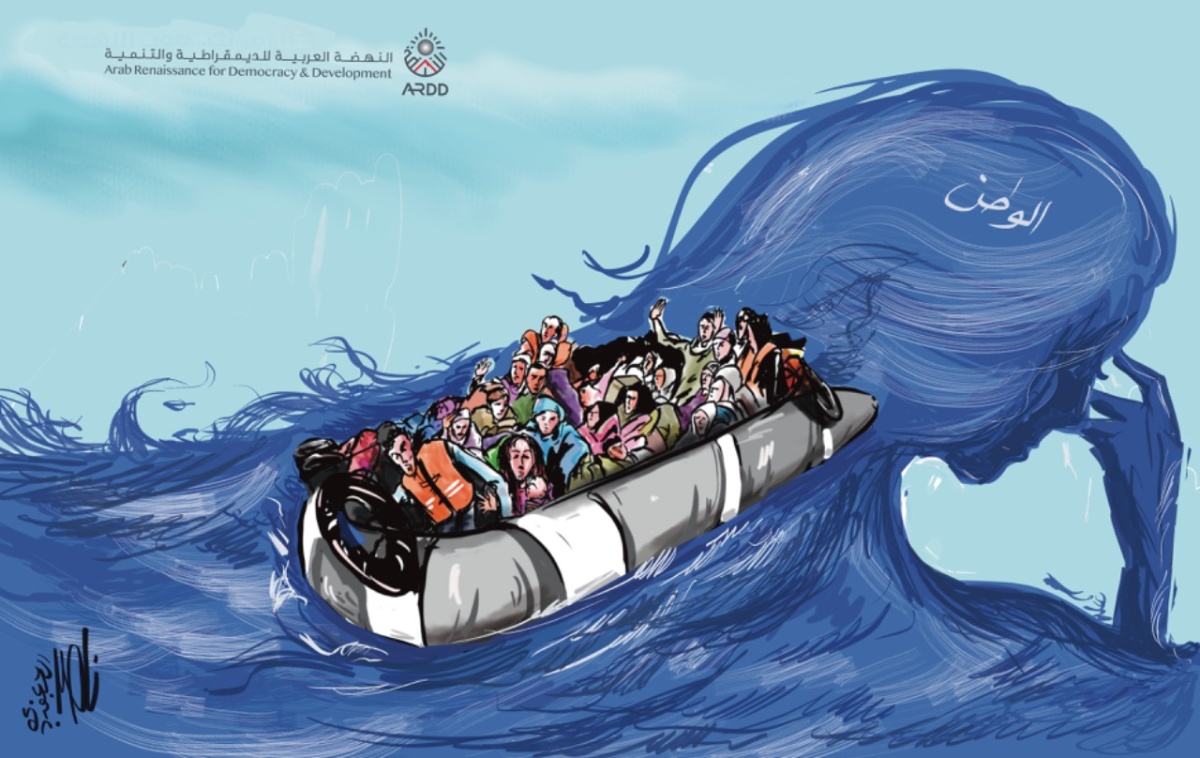On April 24, 2022, a boat carrying about 60 people attempting to reach Europe, capsized off the Lebanese coast, near Tripoli. Six died, and some 50 were rescued.
While we mourn the loss of more lives of people in search of a better life, the occasion should also prompt a sober reflection and principled action to prevent further such tragedies.
The growing number of people who have risked their lives in recent years, including Lebanese, Iraqis, Palestinians, Syrians, and Yemenis, in search of a better future elsewhere is a painful sign of our time. They add to the number of desperate others who embarked on the perilous journey at sea, traveling from all parts of Sub-Saharan Africa. And the number will not stop here.
Their fate is a reminder of the sad reality in the Arab region where living conditions are more and more precarious and citizens are forced to migrate, often under the most dangerous conditions, to escape poverty, misery, persecution, or conflict.
The way most of these journeys end, speaks volumes about the inadequacy of the overall preventive systems. Through international cooperation, a structured localized response needs to be put in place, but such a response cannot be provided by governments alone; they need the concerted effort of all relevant entities, including civil society.
It is imperative that Arab countries start debating with honesty the reality of their citizens and residents, and what pushes them to risk their lives in an attempt to escape this sad reality.
Arab countries should assume responsibility and lead discussions among all countries bordering the Mediterranean Sea guided by a principled human rights agenda, to address the situation once and for all.
The wars in Iraq, Libya, Syria, and Yemen, and the relentless apartheid regime in Palestine, to mention some of the disasters plaguing the Arab world, pushed these countries’ people predominantly toward Europe, which meanwhile has transformed into a real fortress. Its borders have become impregnable to the neediest fleeing war and misery, at the cost of their lives or dignity.
The claim that closing borders to these wretched people safeguard European security is the reason hundreds of thousands of lives have been sacrificed in conflict areas where it is impossible for local authorities to keep them safe (like in Libya, for example), through displacement and migration that forces people to resort to increasingly dangerous routes, including the dangerous sea voyage that is turning the Mediterranean Sea into the cemetery for the dead and of hopes for a better future.
With each life that perishes on these journeys, our morality and humanity get diminished.
MARFA is particularly concerned with how migrants and refugees originating in or passing through the Arab region are treated. In recent times, migrants and asylum seekers from war-torn areas such as Afghanistan, Iraq, Kurdistan, Palestine, and Syria have been aggressively treated, neglected, and pushed back from Belarus, Bulgaria, Latvia, and Poland, among others. Many are stranded in appalling conditions on various Greek islands. Just this winter, many were left to die in the cold a few hundred kilometers from the borders where Ukrainian refugees are, thankfully, being warmly received.
This exclusionary attitude toward refugees from the south is the product of the same policy that Europe adopted vis-à-vis Libya, leaving hundreds of thousands of innocent migrants and refugees, often minors, in the hands of torturers and traffickers, or simply abandoning them at sea.
It is crucial to ensure that the lives and human rights of all individuals forced to flee, due to war or unsustainable living conditions, are respected at all points of their journey, from the country of origin to transit and destination.
Blindly preventing people from migrating is not a solution or the answer to this problem. What is needed is, first and foremost, a candid understanding of the realities underpinning migrants and refugees’ movement, of the different situations that prompted them to migrate, of their needs and their humanity.
Every human being should be treated with humanity and dignity. Regardless of the reason that pushed them to cross an international border, of whether they are migrants or refugees, of their status, these people have the right to seek and enjoy protection. They have the right to have their circumstances evaluated according to international law, which firmly prohibits arbitrary or collective expulsions and refoulement.
The rights to life and freedom from torture, refoulement and collective expulsions are inalienable, and they should be respected by every state. This means they can never be suspended, not even in a state of emergency. In case of death at a border or at sea, investigations must be made to find out the cause of death of every victim, and the results must be made public.
This situation cannot and should not be of concern for human rights groups in the global North only. It is an untenable situation that calls upon the entire Arab region to pause and reflect.
Arab countries should not be just recipients and executors of European political decisions in exchange for aid, the promise of aid, or, worse, military support and cooperation. The Arab region deserves a transformation that is brought about by critical thinking on the part of all of us, as part of an intellectual effort to benefit from the potential of the Arab region, that we all must and want to be part of.
ABOUT MARFA
The Migration and Refugee Forum for the Arab World (MARFA) is an independent network of Arab academics, human rights activists and lawyers that emerged in response to the dire need of a collective approach toward advocating the rights of migrants and refugees, and of raising awareness about related pressing issues in the region, including statelessness and the Arab diaspora.


